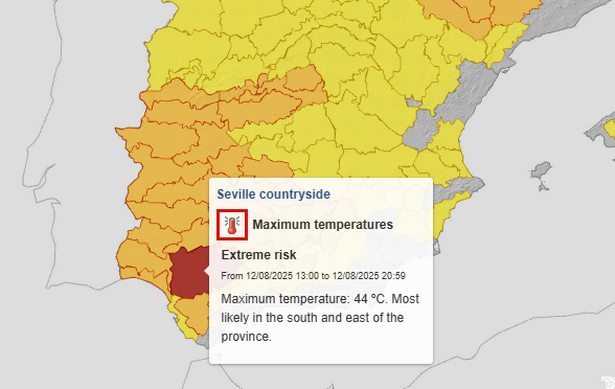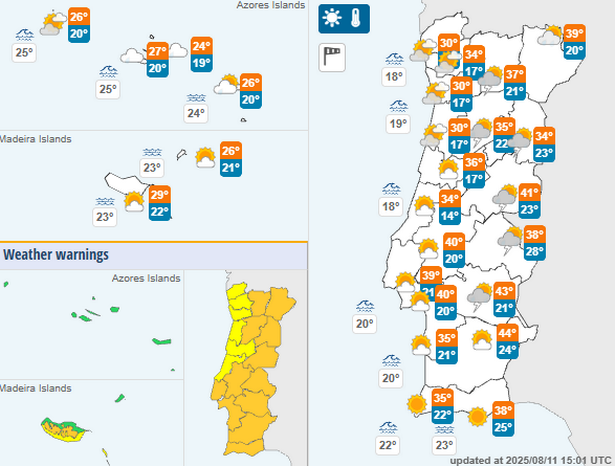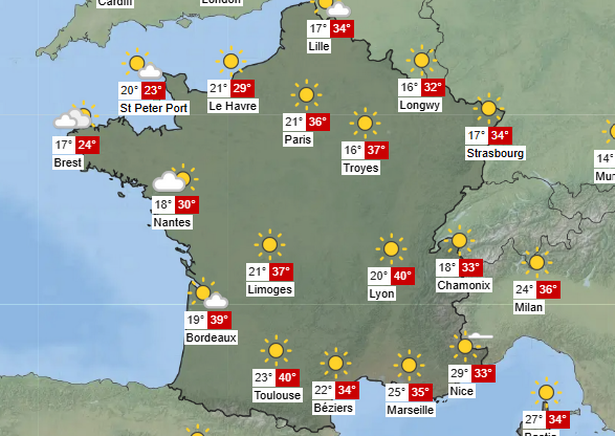Parts of Spain, Portugal, France are set to see temperatures top 40C as urgent weather warnings have been issued Spain is experiencing a widespread rise in temperatures(Image: Anadolu via Getty Images)
Spain is experiencing a widespread rise in temperatures(Image: Anadolu via Getty Images)
UK holidaymakers heading to southern Europe are being warned to brace for extreme heat as parts of Spain, Portugal and France are set to scorch above 40C this week.
While Britain enters its fourth heatwave of summer with temperatures set to hit 34C, much of southern Europe is sweltering in a dangerous heatwave.
On Tuesday (August 12), forecasters say regions of Spain and Portugal could hit a deadly 43-44C, while temperatures in southwest France could also surpass 40C.
Authorities have issued urgent weather alerts to residents, warning of severe health risks as the intense heat grips the region.
With school summer holidays in full swing, the extreme temperatures could also affect thousands of UK tourists heading abroad.
Spain
Aemet, Spain’s national weather agency, issued a special notice for a heatwave which came into force on August 3 and is due to last “at least” until Tuesday.
The weather agency warned of “extreme risk” in Zaragoza and the Basque Country on Monday (August 11), with highs of 40-42C forecast. On Tuesday, temperatures are expected to peak at 44C in the Seville countryside, with another red alert issued. Yellow and orange warnings remain in place across most of the country.
 Highs of 44C are forecast in Seville on Tuesday, August 12(Image: Aemet)
Highs of 44C are forecast in Seville on Tuesday, August 12(Image: Aemet)
Aemet said the heatwave is due to “a warm, dry air mass over much of the Iberian Peninsula and the Canary Islands.”
It added: “This, combined with the high level of sunshine typical of summer, is causing temperatures to be higher than usual for this time of year, resulting in a heatwave.
“[On Tuesday] Temperatures similar to Monday’s are expected inland, exceeding 36-39C, although in parts of the Guadalquivir, temperatures could reach 44C.”
Portugal
UK holidaymakers in Portugal could also see temperatures soar to 44C on Tuesday.
The Portuguese Institute of the Sea and Atmosphere (IPMA) has placed 12 districts on the mainland under an orange warning due to the heat, some of which will remain in effect until Wednesday evening (August 13).
The highest temperatures are forecast in Beja (44C), Évora (43C) and Castelo Branco (41C), with temperatures topping 40C in Setúbal and Santarém.
 Highs of 44C are forecast in parts of Portugal on Tuesday, August 12(Image: IPMA)
Highs of 44C are forecast in parts of Portugal on Tuesday, August 12(Image: IPMA)
The weather agency issued orange alerts from Monday until Wednesday due to the “persistence of very high maximum temperatures”.
France
A blistering heatwave gripped France on Monday, with temperatures soaring to 43C in Charente and Aude in the southwest.
The national weather agency, Meteo-France, has placed 12 departments on red alert – the highest level of heat warning. It placed 41 other departments under lower-level orange alerts.
The red alert has been issued only eight times since it was created in 2004, reports The Independent. The alert is reserved for extreme and prolonged heatwaves that pose significant health risks and have the potential to disrupt daily life.
 Soouthwest France is facing a 40C heatwave, with widespread highs of 37-40C forecast on Tuesday(Image: Meteo-France)
Soouthwest France is facing a 40C heatwave, with widespread highs of 37-40C forecast on Tuesday(Image: Meteo-France)
On Tuesday, 40C temperatures are forecast in Lyon and Toulouse, with highs of 37-39C forecast across much of central and southwestern parts of the country.
Is Europe getting hotter?
Climate experts have warned that human-induced climate change is leading to more frequent and intense heatwaves around the world.
Bas Amelung, a professor in environmental systems analysis at Wageningen University, told the BBC in June that certain parts of Europe might become too hot for many in the future.
“Countries such as Spain, France, Italy, Greece and Turkey that currently attract the traditional ‘sun and sand’ summer tourists are likely to become too hot for comfort in the summer,” he warns.
According to a report published in April by the European Travel Commission (ETC), 81 per cent of Europeans say they have changed their holiday plans as a result of factors related to climate change.
“People make decisions based on their perceptions,” Amelung explains.
“So if a large majority of holidaymakers think some European destinations will soon be ‘too hot’, they may well start adapting, either by going somewhere else in summer or by going to the same place in another season.”
